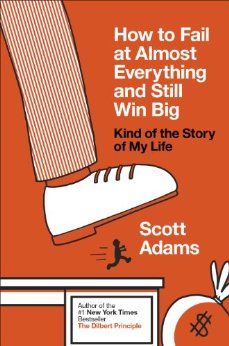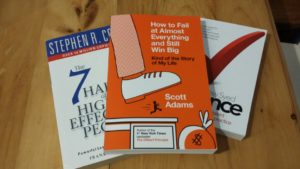How to Succeed Without Setting Goals
How to Fail at Almost Everything and Still Win Big by Scott Adams was released in 2013. Since then I’ve read a lot of excellent reviews of the book. But one thing has struck me – how different each review is. How every single person I know who has ready Adams’ book took something unique away from it.
Before reading How to Fail at Almost Everything, I’d written off the idea of doing a review. It had been over done hadn’t it?
Or had it…
I was about to have a speedy change of mind.
Why You Should Never Set Fitness Goals
Fitness? I thought this was book about success and business? After all, Scott Adams has an estimated net worth of $75 million. Not bad considering he confesses to over 20 business failures.
In reality, Adams book can be applied to other parts of your life. It’s a bit like WD-40 – once you start finding uses for it, you can’t stop!
In chapter 6, Adams takes on the concept of setting goals and how he rejects them as being completely flawed:
“To put it bluntly, goals are for losers. That’s literally true most of the time. If your goal is to lose ten pounds, you will spend every moment until you reach the goal – if you reach it at all – feeling as if you were short of your goal”
So if you set goals, you will exist in a perpetual state of failure unless you achieve your target. And if you do, then what? Do you need a new goal to replace the purpose the old one gave you?
I’ve been to that goal shaped abyss several times:
- I’m going to run a sub-20 minute 5k
- I’ll deadlift 300lbs by the end of the summer
- I’m going to get a six pack and 18 inch arms
- I’ll run a 10 mile trail race in 5 months despite lying on a hospital bed
Sometimes I was successful in reaching my goal, other times I wasn’t. But one thing was common throughout: until I succeeded, I felt like a failure.
And if I did succeed, I felt flat. I felt like I needed something else to give me the rush and the purpose that had driven me to succeed.
There’s also the curse of the personal best. Think about this:
An athlete who is at the top of their game can keep hitting personal bests. But one day, they’ll peak. They won’t go faster or higher or longer. They won’t score more points in a game or pull victory out of the jaws of defeat ever again.
Compared to those glory days, everything will pale in comparison.
Maybe that’s true – your physical peak may be behind you. Will I ever run a sub 20 minute 5000m again? Probably not. Will I ever step into the ring again? Probably not – except for charity. If you invest emotionally in these things and they’re taken away or you never reach those heights again then what?
You can’t keep getting fitter, stronger or leaner forever. First comes the point of diminishing returns, then a plateau that you won’t get past. What happens then?
If your goal is to lose ten pounds or to lose your Dad bod, and you reach it what happens next? Will you go back to eating the same crap you did before? Probably.
You know the guy: Goal Orientated Garry who’s always got some fitness target he’s trying to hit. “I gotta get fit for the holidays” he says. “I’ve given up energy drinks for good this time.”
That’s why, as Adams says, goals are for losers. Because Garry is in a perpetual state of failure. Because only at the very pinnacle of success are you not failing.
Having A System – The Scott Adams Approach
The more I read and study successful people like Adams, Mike Cernovich, James Altucher and Donald Trump, I see the same patterns emerging but with different terminology. While Adams talks of systems, Cernovich calls it his vision, Altucher has his daily practice and Trump likes ‘thinking big’.
All have what Adams would call systems that have led to their success. The last two chapters of How to Fail at Almost Everything and Still Win Big focus on two of my favourite topics: fitness and diet.
Adams explains how he applies the system approach to both aspects. For diet he focuses on:
- Only having access to healthy foods
- Not being in the habit of eating junk foods or desserts
- Whole foods with a focus on easily prepared flavourful meals and snacks
Within certain parameters, Adams can eat whatever he wants. This freedom is the opposite of restrictive – it’s liberating.

I’ve applied this approach in my own diet in the last few years. Instead of being rigid and obsessing over meal timing and getting in 6 small meals a day – something which is neither practical or even proven to be necessary for health – I’ve simplified things massively.
I only eat a few similar foods during the week but I can have as much fruit or vegetables/salad as I want.
I’ll eat clean throughout the week but for a few hours on a Saturday, I allow myself to eat and drink whatever I want. My favourite would be a big stuffed crust pizza and some cupcakes.
The same goes for my training. After completely burning out with high intensity workouts, I decided to see if I could maintain fitness with minimum effort while still looking and feeling good.
My ‘system’ looks like this:
- Always lift in the mornings – it’s the best time for me
- Lift weights 3 times a week
- Do cardio or conditioning 3 times a week
- Aim to not train for more than 1 hour in one day
- Have at least one ‘off day’ a week
I keep things simple – that’s why Jim Wendler’s 5/3/1 and Boring But Big work for me.
If it’s simple, then I don’t have to think about it.
And if I don’t have to think about it, I’m much more likely to do it.
Right now I punch in a few numbers into my 5/3/1 calculator and BOOM! I’ve got workouts for 4 weeks.
Week in, week out, my training looks roughly the same. I don’t have goals. I just want to be strong, look good and feel good
Think about it: The people who tell you to change your workouts every 4 weeks are trying to sell you a new muscle magazine every 4 weeks!
Personal Choices and the Scott Adams Systems Approach
People are probably put off by the systems approach because it encourages personal responsibility and choices. It’s simpler to say ‘I’m not eating that slice of pie because I’m on a diet’ than ‘I don’t eat pie except between 6 and 8 pm on a Saturday.’
Having a system also takes work, time and effort to develop. My system may not work for you or anyone else for that matter. Adams’ system wouldn’t work for me that’s for sure (he doesn’t eat red meat).
If you’re going to have a system, you need to spend time developing it. Buying Scott Adams book would be a good place to start as you read how he’s developed systems for nearly everything including his business successes.
Then look at your own life. What healthy foods do you like? Eat more of those. What training do you like doing and when? Do more of that at the times that suit you.
Finally, I want to add my approach to fitness and diet: I’m in this for the long game – not to get six pack abs or compete in a physique competition.
Instead I want to be a healthy, fit, lean man into my 40s, 50s and onwards. My approach has changed with the arrival of my children.
Every day that I’m able to run, jump and wrestle with them is one I cherish. If I can keep doing that for decades to come, I’ll have found an element of physical fulfillment so precious, I’ll never want to let it go.
You can buy Scott Adams’ book here (Amazon)
Did you know Scott Adams always provides a link to his book at the end of each of his blog posts? I don’t have a book to sell you, but I do have a mailing list that comes with a free Ebook when you sign up (also for free).



Fantastic review. You are correct about Adams’ book–which I read and reviewed myself this past summer (https://amatopia.wordpress.com/2016/06/06/book-review-how-to-fail-at-almost-everything-and-still-win-big-by-scott-adams/)–in that it’s useful in a huge variety of settings.
Your examples of exercise and diet systems are great . . . I’m going to crib a few of them if you don’t mind. I’ve found the systems approach a boon to my own fitness, and it brings to mind an American basketball player named Ray Allen.
Ray Allen is one of the best shooters ever in the history of American basketball. How does he do it? Absolute consistency. When he practices and plays, he’s not out to “sink x amount of three-pointers” or “score x amount of points.” His goal is to have the exact same shooting form every single time he shoots. That’s how he practices and that’s how he plays. He’s not too worried if the shots go in or not because he knows they will more often than not, as long as he’s consistent with his form (i.e., his system). And as he’s one of the best shooters ever, I think he’s proven the validity of his approach.
I think if he was goals-oriented, like “I must have a 20 points-per-game average,” he wouldn’t be as good as he is now. The psychology of systems versus goals is an amazing thing to behold.
Long-winded comment. Great post!
Thanks Alex, I read your review and enjoyed it. It’s great that we can all read the same book and get different things from it. I like your example of Ray Allen. Let me know how you get on using the systems approach for your fitness.
Neil